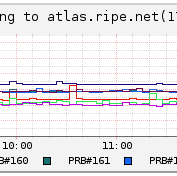
RIPE Atlas User-Defined Measurements Are Here
• 2 min read
RIPE Atlas user-defined measurements are here! Hosts and sponsors can begin creating personalised measurements from probes around the globe.

Articles
Likes on articles

Vesna Manojlovic is Community Builder at RIPE NCC. Vesna joined the RIPE NCC as a Trainer in 1999. In 2003, she took responsibility for developing and delivering advanced courses, such as RPSL, Routing Registry, DNSSEC and IPv6. In 2008, she lead efforts to establish IPv6 RIPEness as a measure of IPv6 deployment among LIRs. In 2011, she joined the Science Division as Manager of the Measurements Community Building team; in 2015 she moved to Communications Department as Senior Community Builder, with a focus on organising hackathons. Vesna gives presentations at many technical conferences and workshops, and enjoys visiting hackerspaces. Vesna received a Batchelor of Sciences Degree in Computer Science and Informatics from the School of Electrical Engineering, University of Belgrade. She has three children.

• 2 min read
RIPE Atlas user-defined measurements are here! Hosts and sponsors can begin creating personalised measurements from probes around the globe.
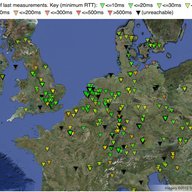
• 2 min read
RIPE Atlas is now accessible for all the RIPE Labs users and LIR Portal users, via "RIPE NCC Access" (single sign on system).
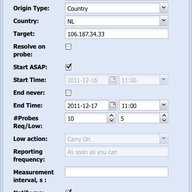
• 6 min read
We started beta-testing User Defined Measurements (UDM) for RIPE Atlas. The first results are encouraging and we are receiving useful feedback from happy users.
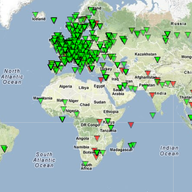
• 2 min read
We are proud to announce that over 1024 RIPE Atlas probes are now active, distributed over the whole world! This is an important milestone. It was one of our goals for 2011, and we achieved it!
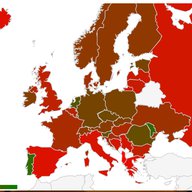
• 4 min read
Following your feedback, we decided to make IPv6 RIPEness a production service. We are currently working on some new features. Stay tuned!
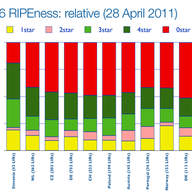
• 6 min read
A year ago we introduced IPv6 RIPEness - a system that rates IPv6 deployment of Local Internet Registries based on certain criteria. It was meant to encourage LIRs to deploy IPv6. Now, one year later, we are proud to present the progress of this project.

• 8 min read
We recently posted an article about IPv6 "RIPEness", a four-star rating system of Local Internet Registry (LIR) IPv6 deployment.

• 6 min read
We looked at all LIRs registerd in the RIPE NCC service region and determined their home country based on their Reg-ID (country-code.name).
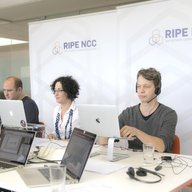
• 4 min read
On the 5 October 2017 we launched our very first RIPE NCC::Educa event. It turned out to be quite a success. Here's a summary and some plans for next year.
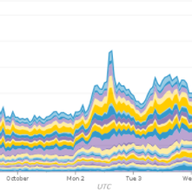
• 7 min read
Please find in this article insights into solutions that mid-size organisations need to deploy on the DNS and BGP level. We are monitoring success using, among other tools, RIPE Atlas.

• 10 min read
This is the first in a series of blog posts on efforts to increase diversity and inclusivity in the RIPE community. The focus of this article is to report on activities before and during the RIPE 74 Meeting in Budapest in May 2017. We also invite you to join the mailing list, and help shape the ne…
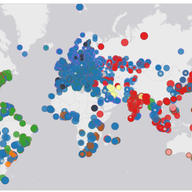
• 7 min read
The RIPE NCC's fifth hackathon event will happen in Amsterdam, in April 2017. We would like to invite operators, designers, researchers and developers to take on the challenge and join us in developing new tools and visualisations for DNS measurements.
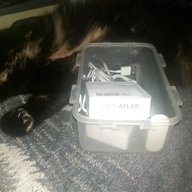
• 8 min read
This article is intended to make RIPE Atlas users aware of ethical issues that could arise when using RIPE Atlas. We do not intend to propose any new formal processes or procedures to address the relevant ethical issues, but we do want to encourage members of the RIPE Atlas community to consider th…

• 7 min read
The RIPE NCC is hosting a hackathon focused on developing tools for Internet Exchange Points. Come participate!

• 5 min read
The RIPE Atlas Interface Hackathon is an opportunity to work together with RIPE Atlas developers and other enthusiastic coders and hackers. The hackathon will take place from 21-22 May in Copenhagen ahead of the RIPE 72 Meeting. Find out how you can take part!
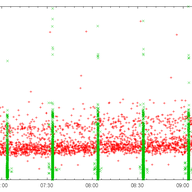
• 12 min read
There are a number of interesting new features and enhancements for RIPE Atlas users. Learn how you can put them to use!
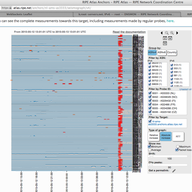
• 3 min read
During the RIPE 70 Meeting in Amsterdam this week (on 13 May around 10:00 UTC), we experienced a network outage at AMS-IX. Let's see how this was monitored by various tools.
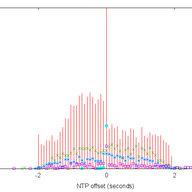
• 13 min read
This article describes how RIPE Atlas probes and anchors maintain their clocks, and how accurate these clocks are. We also plan to make the NTP measurements we describe here available as an additional measurement type for RIPE Atlas users.
“CAIDA wrote a blog post about the hackathon results: https://blog.caida.org/best_available_data/2016/11/11/the-remote-peering-jedi/”
... and two more mentions: Euro-IX Newsletter http://us7.campaign-archive2.com/?u=99dcdddc67f83b726fa293b31&id=4dcbc6b909&e=c4430325ce & #37 Weekly Internet Infrastructure Updates from Christian Koch: http://us12.campaign-archive1.com/?u=d732e9c6adbea385abc856c8d&id=950ca992ef
CAIDA wrote a blog post about the hackathon results: https://blog.caida.org/best_available_data/2016/11/11/the-remote-peering-jedi/
Geert Jan, thank you for helping us to grow RIPE Atlas in the "not so easy" parts of the world! As for your questions, we considered them, and I would like to separate two aspects: - We are indeed distribute probes (also thanks to ambassadors like you) to all parts of the world. However, probes are still predominantly deployed in the parts of the Internet that is already covered pretty well - maybe that's due to the nature of the ”network effect”. - This specific article was not looking into the numbers of probes that were lost, postponed, or for other reasons *never connected*. All probes in the analysis and the graphs above were connected at some point in their lifetime, and then either continued to live or "died”. We will continue to observe RIPE Atlas probe distribution, deployment and lifetime, and we will publish an update when there are any new developments.
Showing 43 comment(s)